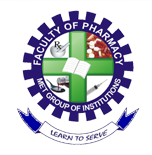Department of Pharmceutical Chemistry
Departments
Department of Pharmceutical Chemistry
Since it covers many facets of developing new drugs, the Department of Pharmaceutical Chemistry is a crucial component of a pharmacy education programme. In order to develop a student into a true pharmacy professional, the subject of pharmaceutical chemistry is crucial. Students will be exposed to a wide range of contemporary, cutting-edge research, not only in the pharmaceutical sciences but also interdisciplinary research, which is essential for a successful career in the field of their choice, thanks to the department’s collaborative research environment with other departments of the institute.
For diploma students, undergraduate students, and postgraduate students, the department conducts lectures on the topics of organic chemistry, general chemistry, pharmaceutical / medicinal chemistry, and pharmaceutical analysis. This department’s faculty members have extensive backgrounds in synthetic, analytical, material, computational, and biochemical chemistry. From this foundation, the department has grown and today has top-notch expertise in synthetic and chemical biology, structure prediction, analysis, and interpretation. To ensure that students can use their theoretical knowledge in the real world, the curriculum includes both lengthy lectures and laboratory sessions.
The department actively participates in a training programme to provide students with hands-on experience using various advanced instruments, including HPLC, FT-IR, Cell Bio-analyzer, UV-Visible spectrophotometer, Electronic Balance, Meting Point Apparatus, Digital pH meter, Flame Photometer, and other analytical instruments.The Department of Pharmacy Practice is an academic department within the MET Faculty of Pharmacy that specialises in imparting advanced pharmacy practise and providing excellent clinical pharmacy education to our D.Pharm and B.Pharm students. The department provides training and information about patient counselling, drug information services, pharmacokinetics, medication reconciliation, pharmacovigilance, clinical trials, health screening services, health awareness programmes, community outreach programmes, and organise medical camps to clinicians, allied health-care professionals, and patients.
The department is dedicated to educate, train, and service excellence through covering detailed subject areas of Health Education & Community Pharmacy, Hospital Pharmacy, Pharmacovigilance, Pharmacotherapeutics, Pathophysiology. Through innovative teaching methods and the development of skills to stimulate critical thinking and the appropriate use of pharmaceuticals, the department plays a significant role in instilling the ongoing Pharmacy education programme. The curriculum is intended to convey detailed knowledge and competencies required for pharmacy practise, such as providing pharmaceutical care services to both healthcare professionals and patients in clinical settings, and it allows students to perform clinical studies.
Department of Pharmaceutical Analysis
To assess the quality, safety, and effectiveness of pharmaceutical products, the department of pharmaceutical analysis works with the examination of both raw materials and completed pharmaceutical formulations.
At the undergraduate level, the department is engaged in teaching the subject matter that a student needs to master to understand the current situation of quality control and quality assurance of pharmaceutical substances in accordance with the needs of the Pharmaceutical Industry and regulatory requirements. The topic contains an introduction to different pharmacopoeias like BP, USP, IP and other monographs as well as a discussion of the various analytical techniques employed by pharmacopoeias for the examination of drug substances and drug products.
The department offers a thorough postgraduate curriculum that emphasises coursework and research on the most recent developments in pharmaceutical and biological analyses, quality control, and regulatory issues. The students are driven to grow holistically, which includes developing their personalities, writing in the sciences, interpreting data, presenting findings, documenting their work, following proper laboratory procedures, and developing their communication and soft skills.
For the analytical characterization of pharmaceuticals and excipients, the Department of Pharmaceutical Analysis has state-of-the-art spectroscopy and chromatography facilities like UV Double beam Spectro photometer, FTIR spectrophotometer, Fluorimeter, Flame photometer, Colorimeter, Potentiometer and HPLC. The department offers advanced laboratories for undergraduate and graduate students in addition to a research lab for postgraduate students.
Essential Skills
- Simultaneous estimation of drugs
- Impurity profiling of drug substances
- Analysis of secondary metabolite
- Volatile component analysis
- Identification and characterization of impurities
- Structural Elucidation of unknown compounds
- Crude drug Analysis
- Development and validation of analytical and bioanalytical methods utilising conventional and Quality by Design (QbD) methods.
- Drug and metabolite pharmacokinetic studies
- Dissolution testing of drug products
- Stability testing of drug products
- Isolation and purification of natural products






